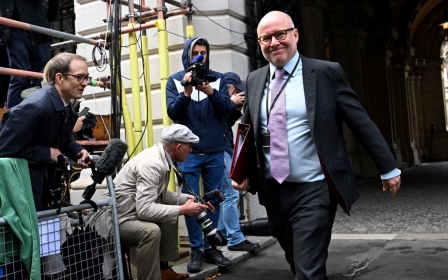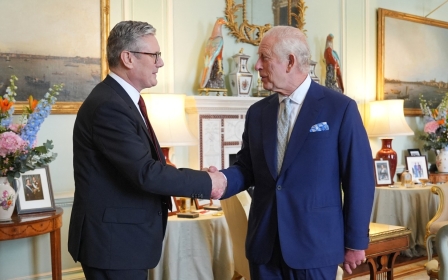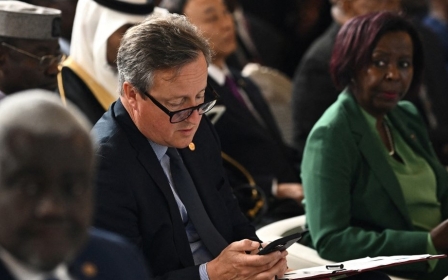UK: Labour to drop ICC challenge over Netanyahu arrest warrant

The UK’s new Labour government is expected to drop its attempt to delay the International Criminal Court’s (ICC) decision on whether an arrest warrant can be issued against Israeli Prime Minister Benjamin Netanyahu, according to the Guardian.
This comes after the Conservative government was last week accused of attempting to obstruct the prosecution of Israeli war crimes by delaying the International Criminal Court’s (ICC) decision.
On Friday 5 July, Keir Starmer's Labour party swept to a landslide victory in the UK's general election.
In late May, ICC prosecutor Karim Khan filed an application for arrest warrants for Israeli Prime Minister Netanyahu and Defence Minister Yoav Gallant, as well as Hamas leaders Yahya Sinwar, Ismail Haniyeh and Mohammed Deif, for alleged war crimes.
The UK, an ICC member state, filed a request on 10 June to provide written information arguing that since Palestinian authorities do not have jurisdiction over Israeli nationals under the accords, they cannot transfer jurisdiction to the ICC.
New MEE newsletter: Jerusalem Dispatch
Sign up to get the latest insights and analysis on Israel-Palestine, alongside Turkey Unpacked and other MEE newsletters
On 27 June, ICC judges ruled the UK can submit legal arguments in the case and gave the country until 12 July to provide its claim.
But Labour officials have briefed that the new government believes the ICC has jurisdiction over Gaza. This means that the potential delay on the ICC’s ruling on the request for arrest warrants will no longer occur.
On Sunday, Downing Street announced that Prime Minister Keir Starmer told Netanyahu in a phone call he “looked forward to further deepening the close relationship” between Britain and Israel, but also urged a ceasefire in Gaza.
The same day, Starmer told the Palestinian Authority President Mahmoud Abbas that his immediate priorities were “securing a ceasefire, the return of hostages, an increase and acceleration in humanitarian aid and financial support for the Palestinian Authority,” according to a Downing Street spokesperson.
Palestinian statehood is 'inalienable right'
For months, many voters across the UK had voiced dissatisfaction with Labour over the party's early stance during Israel’s war on Gaza when it called for an "enduring cessation of fighting" instead of an immediate and comprehensive ceasefire.
Starmer also appeared to back Israel's decision to cut Gaza from power, water and other necessities, despite legal experts condemning the move as a war crime.
The party later shifted its position and Labour denied Starmer was supportive of Israel's total siege.
Labour’s election manifesto stated that "Palestinian statehood is the inalienable right of the Palestinian people. It is not in the gift of any neighbour and is also essential to the long-term security of Israel.
"We are committed to recognising a Palestinian state as a contribution to a renewed peace process which results in a two-state solution with a safe and secure Israel alongside a viable and sovereign Palestinian state."
This was in distinction from two other parties, the Liberal Democrats and the Scottish National Party - both of which advocated recognising Palestinian statehood with immediate effect.
Despite Labour’s landslide victory on 5 July, it appears to have haemorrhaged votes to candidates campaigning on a pro-Palestinian platform, several of whom picked up shock wins.
Meanwhile, Labour has vowed to deepen its ties with Gulf states. Foreign Secretary David Lammy called Sheikh Abdullah bin Zayed, the UAE's foreign minister, on Saturday.
The next day, in a call with President Sheikh Mohammed bin Zayed, Starmer agreed to "deepen co-operation" with the UAE on trade and investment, defence and cyber security.
Middle East Eye delivers independent and unrivalled coverage and analysis of the Middle East, North Africa and beyond. To learn more about republishing this content and the associated fees, please fill out this form. More about MEE can be found here.





